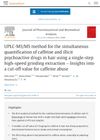 August 2024 in “Cosmetics”
August 2024 in “Cosmetics” Caffeine is beneficial for skin and hair treatments but needs better delivery methods to penetrate deeper skin layers.
 130 citations,
August 2020 in “Drug Design Development and Therapy”
130 citations,
August 2020 in “Drug Design Development and Therapy” Nanoparticles can improve skin drug delivery but have challenges like toxicity and stability that need more research.
 8 citations,
January 2020 in “Skin Pharmacology and Physiology”
8 citations,
January 2020 in “Skin Pharmacology and Physiology” Caffeine improves hair growth, thickness, and reduces shedding.
[object Object]  1 citations,
July 2023 in “Cureus”
1 citations,
July 2023 in “Cureus” Some treatments for hereditary hair loss are effective but vary in results and side effects; new therapies show promise but need more research.
 153 citations,
October 2012 in “Skin Pharmacology and Physiology”
153 citations,
October 2012 in “Skin Pharmacology and Physiology” Caffeine in cosmetics may reduce cellulite, protect skin, and stimulate hair growth, but more research is needed on its use and effects.
 7 citations,
July 2018 in “International Journal of Applied Pharmaceutics”
7 citations,
July 2018 in “International Journal of Applied Pharmaceutics” Chitosan nanoparticles are promising for sustained caffeine delivery through the skin.
 3 citations,
April 2019 in “Journal of Dermatological Treatment”
3 citations,
April 2019 in “Journal of Dermatological Treatment” Caffeine shows promise for treating some types of hair loss, but more research is needed.
 67 citations,
November 2019 in “Molecules”
67 citations,
November 2019 in “Molecules” Tea, especially green tea, shows promise in cosmetics for skin and hair benefits but more research is needed for effective use.
 June 2015 in “Biomedical and biopharmaceutical research”
June 2015 in “Biomedical and biopharmaceutical research” The congress showed advancements in skin hydration, barrier function, and safe, effective new cosmetic formulations.

Topical treatments like minoxidil and corticosteroids are effective for hair loss, with JAK inhibitors promising for alopecia areata.
December 2024 in “Skin Appendage Disorders” Non-prescription products can help manage androgenic alopecia.
2 citations,
January 2016 Optimized formulations with specific ingredients can significantly improve skin delivery of topical drugs.
12 citations,
May 2013 in “International Journal of Dermatology” Ethosomes improve black tea extract absorption in hair dye.
 31 citations,
February 2019 in “International Journal of Cosmetic Science”
31 citations,
February 2019 in “International Journal of Cosmetic Science” Caffeine applied to the scalp can protect hair follicles from UV damage.
 April 2019 in “Journal of Investigative Dermatology”
April 2019 in “Journal of Investigative Dermatology” Caffeine can protect scalp hair follicles from damage caused by UV radiation.
 32 citations,
December 2017 in “Journal of Drug Delivery Science and Technology”
32 citations,
December 2017 in “Journal of Drug Delivery Science and Technology” Minoxidil and caffeine in transfersomes improve hair growth treatment.
 21 citations,
January 2017 in “Skin Pharmacology and Physiology”
21 citations,
January 2017 in “Skin Pharmacology and Physiology” Caffeine-based liquid 0.2% is as effective as minoxidil 5% for treating male hair loss.
 8 citations,
April 2020 in “European Journal of Nutrition”
8 citations,
April 2020 in “European Journal of Nutrition” Newborns' hair shows how much caffeine their mothers drank during pregnancy.
 1 citations,
July 2017 in “Journal der Deutschen Dermatologischen Gesellschaft”
1 citations,
July 2017 in “Journal der Deutschen Dermatologischen Gesellschaft” Topical caffeine improves hair loss intensity, speed, and shedding, and works better with minoxidil/azelaic acid.
 6 citations,
January 2020 in “Skin Pharmacology and Physiology”
6 citations,
January 2020 in “Skin Pharmacology and Physiology” HIF-1α stimulators, like deferiprone, work as well as popular hair loss treatments, minoxidil and caffeine, in promoting hair growth.
 5 citations,
November 2021 in “Frontiers in Cell and Developmental Biology”
5 citations,
November 2021 in “Frontiers in Cell and Developmental Biology” Caffeine can damage hearing cells and affect hearing recovery after ear trauma.
 4 citations,
February 2022 in “Journal of Pharmaceutical and Biomedical Analysis”
4 citations,
February 2022 in “Journal of Pharmaceutical and Biomedical Analysis” The conclusion is that a new method can measure caffeine and drugs in hair, finding caffeine abusers have 70 times more caffeine than normal, with a proposed cut-off value for abuse.
 1 citations,
July 2023 in “Cosmetics”
1 citations,
July 2023 in “Cosmetics” The new shampoo effectively delivers caffeine to hair follicles to help keep hair, especially as people age.
 1 citations,
January 2019 in “Advances in Medical Sciences”
1 citations,
January 2019 in “Advances in Medical Sciences” The combination of azelaic acid, minoxidil, and caffeine significantly increased the survival of skin flaps by affecting certain body channels and nitric oxide levels.
[object Object]  December 2024 in “http://isrctn.com/”
December 2024 in “http://isrctn.com/” MpowerTM may improve hair growth and satisfaction more than plain minoxidil, with mild side effects.
 November 2024 in “International Journal of Molecular Sciences”
November 2024 in “International Journal of Molecular Sciences” Nanoparticles may improve caffeine delivery for hair growth, offering a potential alternative to minoxidil for hair loss treatment.
 August 2023 in “Scientia Pharmaceutica”
August 2023 in “Scientia Pharmaceutica” Color changes in Minoxidil hair products do not affect their effectiveness.
3 citations,
January 2017 in “Journal of cardiovascular pharmacology” Re-evaluating minoxidil, reducing sodium intake, and addressing arteriolar hypertrophy can improve hypertension management.
24 citations,
September 2020 in “Pharmaceutics” Lidocaine-loaded microparticles effectively relieve pain and fight bacteria in wounds.

TrichoSolTM is safe for hair loss treatments with specific ingredient stability for up to 180 days.

























